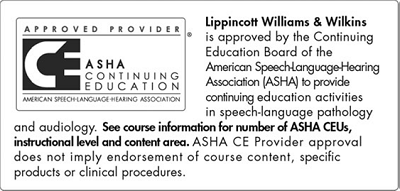{{ (moduleVm.actions && moduleVm.changeStatus) ? moduleVm.status : '' }} Culturally Responsive Language and Literacy Instruction with Native American Children
Activity Steps
Description
Note: ASHA CEUs cannot be reported to ASHA unless your ASHA member number is included in your profile. Speech-Language Pathologist (SLPs) will learn about the Culturally Responsive Language and Literacy Instruction (CRELI) project as a language-focused literacy and differentiated instructional approach. This includes SLPs identifying the historical reasons for academic and achievement gaps and risk ratios for American Indian/Alaskan Natives (AI/AN) in special education services, the role of SLPs with language-focused curricula and CRELI. SLPs will gain knowledge on use of culturally sensitive teaching for speech/language pathology. Accreditation
This course is offered for 0.1 ASHA CEUs
(Intermediate Level, Professional Area).
Purpose of Activity
To gain knowledge about the Culturally Responsive Language and Literacy Instruction project as a language-focused literacy and differentiated instructional approach.Learning Objectives
After completing this continuing education activity you will be able to:
- Identify the historical reasons for academic and achievement gaps and risk ratios for American Indian/Alaskan Natives (AI/AN) in special education services.
- Summarize the role of the Speech-Language Pathologist (SLP) with language-focused curricula and Culturally Responsive Early Literacy Instruction (CRELI).
- Explain culturally sensitive teaching in speech/language pathology.
Disclosures
This program is focused on a specific service.
Culturally Responsive Early Literacy Instruction (CRELI) was a project funded by the U.S. Office of Special Education Programs to train graduate scholars in speech?language pathology to work with American Indian/Alaska Native communities. The grant scholars and staff of CRELI worked with two early childhood education centers for American Indian preschoolers and developed curriculum units that featured culturally relevant storybooks as thematic centerpieces and activities to facilitate early language and literacy development. This clinical tutorial summarizes this work, broader components of culturally responsive teaching, and attributes of language-focused literacy curriculum and differentiated instruction, followed by a sample curriculum unit to demonstrate application of culturally responsive teaching concepts.
Matthew Gillispie, PhD, CCC-SLP
Financial: Matthew Gillispie, PhD, CCC-SLP was Project Director of the Culturally Responsive Early Literacy Instruction (CRELI) personnel preparation project, described in this article and funded by the U.S. Department of Education, Office of Special Education Programs (OSEP) Personnel Preparation grants (H325K130316).
Nonfinancial: Matthew Gillispie, PhD, CCC-SLP, is a clinical associate professor and Director of the Schiefelbusch Speech-Language-Hearing Clinic at the University of Kansas. His clinical and research interests include the assessment of and intervention for children with speech, language, and literacy disorders, including cultural and linguistic considerations when working with Native American children and families.
Credits:
- ASHA 0.1 CH